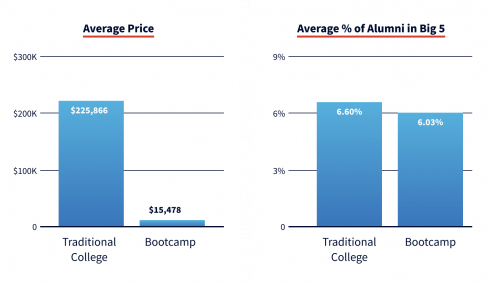
Getting a computer science degree is no longer the only path to a software engineering role. Several of tech’s most sought-after companies to work for don’t require a college degree to land a job, and accept coding bootcamp graduates or candidates who have completed some other forms of instruction.
A new report from the tech education resource company Switchup analyzed which bootcamps can land people jobs at the Big Five companies: Amazon, Apple, Facebook, Google, and Microsoft.
Switchup analyzed LinkedIn data of alumni from coding bootcamps that hold jobs at the Big Five. It analyzed employment rates for 370 bootcamps.
RELATED CONTENT: Bootcamps and MOOCs are picking up STEAM
The number one coding bootcamp attended by employees of the Big Five was Code Fellows. Eleven percent of Code Fellows’ graduates are employed at the Big Five. The bootcamp had about 2,000 alumni listed on LinkedIn. It had a similar percentage of alumni employed as Stanford University, and was higher compared to Cornell University’s 9.44% and University of California-Berkeley’s 8.68%.
The next best bootcamp was Hackbright Academy (5.82%), followed by Hack Reactor (5.16%), Product School (4.94%), App Academy (4.71%), Coding Dojo (4.40%), Galvanize (3.98%), Fullstack Academy (3.19%), General Assembly (2.70%), and Udacity (2.39%).
According to Switchup, one of the biggest draws of coding bootcamps over college is the price tag. The most expensive bootcamps cost less than $30,000, while top universities can cost more than $250,000.
“Overall, our findings showed coding bootcamps offered competitive employment results compared to computer science degrees from top universities, at around 10% of the cost,” Sung Rhee, founder and CEO of Optimal, the parent company of Switchup, wrote in a post.
The survey found that certain prestigious universities, including Stanford University, Cornell University, and University of California-Berkeley, had higher rates of employment at the Big Five, but overall, the average employment rates for computer science graduates and bootcamp graduates were similar. The average percentage of alumni from a traditional college employed at a Big Five company was 6.60% and the percentage for bootcamp alumni was 6.03%.
“While traditional computer science degrees still have a significant foothold in tech education, the industry is rapidly evolving – faster than university curriculums can change, in many cases. These comparable job outcomes show bootcamps can be a strong alternative to traditional degree pathways. Given the massive need for short-term education options to get workers retrained after the pandemic, bootcamps are well-positioned to play a key role in the economic recovery in the coming years,” Rhee wrote.




